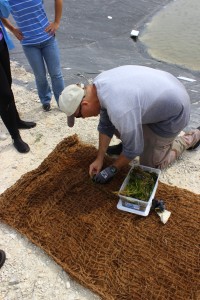It started with a single blade of eelgrass, actually thousands of them.
District springs experts are hoping those blades of grass will thrive and grow into dense vegetation that will improve water quality and sustain beneficial fish and wildlife habitats in Kings Bay.
The pilot project is part of the District’s Hunters Cove Restoration Project. The first phase of the project is to grow a special type of eelgrass in mats made of coconut coir material. This eelgrass variety, cultivated by the University of Florida’s Institute of Food and Agricultural Sciences (IFAS), is extremely hardy and salt tolerant, which has earned it the nickname “Rock Star” eelgrass.

“I nicknamed it that because it’s a fantastic performer,” said Lyn Gettys, IFAS researcher. She grew the grass in tanks in Fort Lauderdale and then transported them to ponds at the Mariculture Center at Duke Energy in Crystal River. At the Duke ponds, the blades were inserted into mats where they can root and grow out in the mats. The process should take a few months.
In the second phase, the mats of eelgrass will be transferred to Hunters Cove and laid on the bottom of the cove in sections, similar to planting sod on land. Protective cages will cover the mats to prevent manatees from grazing on the grass before it is established. Once established, the eelgrass will provide a food source for manatees and help improve habitat and water quality in Kings Bay.
This vegetation provides food and shelter for fish and wildlife, and helps improve water quality by filtering particles. It also removes nutrients from the water and stabilizes sediments.

Spring systems are harmed when undesirable aquatic plants prohibit native vegetation, such as eelgrass, from growing. Lyngbya, is an algae that grows quickly and has taken over much of Hunters Cove — as it has in many springs in the region. Once Lyngbya is established, it is nearly impossible for eelgrass to reestablish on its own. Part of this project is the physical removal of Lyngbya and muck from the bottom of the cove, which is necessary for beneficial grasses to survive once replanted.
The second phase is expected to start in late summer 2014. If this pilot project is successful, there may be additional plantings in other areas of Kings Bay as well as in other spring systems.
For more on the District’s efforts to restore our springs, visit WaterMatters.org/Springs
